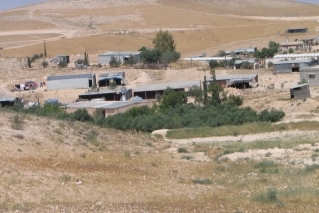 An unrecognized village, photo by Sliman Abu Zaid
An unrecognized village, photo by Sliman Abu ZaidBir Hadaj residents prevented from registering for regional council elections; Opinion warns that allowing Bedouin petitioners to vote in predominately Jewish regional council would be “destructive.”
This morning the High Court of Justice ruled against residents of the community of Bir Hadaj in their petition against the Ministry of Interior. The petition, submitted by the Association for Civil Rights in Israel (ACRI) on behalf of the residents, challenged the Ministry of the Interior’s refusal to register them to vote in the upcoming regional council elections. In a shocking decision that mixes formalism with realism, the three-justice panel (Elyakim Rubenstein, Zvi Zybertal, and Hanan Melcer) relied on a formal technicality to prevent residents from voting in one region’s elections, and on substantive equity to prevent them from voting in another’s, leaving the petitioners bereft of their constitutional right to representation.
Bir Hadaj, a town of 4500 in the Northern Negev, is in the process of being officially recognized, and is part of the Abu Basama Regional Council. The master plan for the town, whose implementation has not yet been completed, drew lines that left some 60% of the residents outside the town limits, and thus technically outside of the Abu Basama Regional Council. These residents are planning to move into the town limits and build homes but cannot do so until a completed master plan allows them to construct their homes legally. Although the settlement master plan was approved in 2003, the Interior Ministry has dragged its feet for nine years. In the meantime, the areas outside the town limits are technically part of the Ramat HaNegev Regional Council.
Regional council elections are scheduled to take place on December 12 and voter registration closed on July 8. The petitioners, residents of Bir Hadaj who live outside the city lines, sought to register as residents of Abu Basma, but the Interior Ministry refused to register them as such because they do not live in the community. The residents then turned to the Council of Ramat HaNegev where they are nominally located, and but there too were prevented from registering. They petitioned the High Court of Justice for an injunction allowing them to exercise their right to vote in at least one of the council elections, but in the decision issued today, the Court rejected their petition.
The opinion, written by Justice Rubenstein, relied on formal grounds to deny the petitioners the right to vote in the Abu Basma Regional Council (until they become residents of Bir Hajad). Yet when presented with the alternative solution derived from the same formal logic (allowing the petitioners to vote in Ramat HaNegev), the Court relied on substantive equity to prevent them from voting in a council where they apparently don’t belong:
“We cannot lend a hand to a fictitious solution of ‘as if’ the people live Abu Basma when they don’t, nor to an unfair solution, not to mention destructive, with respect to Ramat HaNegev, of ‘as if’ they are residents.” (Paragraph 10) (emphasis added)
ACRI Attorney Rawia Aburabia, who submitted the petition: “Today’s decision exemplifies the disturbing position of the Israeli legal establishment vis-à-vis Bedouin Arab citizens. Not only is the Court denying the petitioners their right to vote in the upcoming regional council elections, it is justifying this denial on the toxic implication that there is something inherently ‘destructive’ about allowing Arabs to vote in a Jewish regional council.”
For the opinion (in Hebrew) click here.







